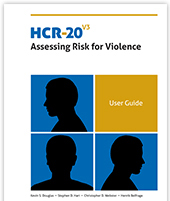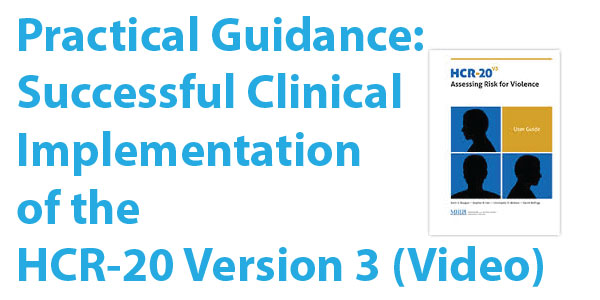 According to a recent survey, the HCR-20 is the most commonly used violence risk assessment measure across 44 different countries. The HCR-20 assists professionals in correctional, mental health, and forensic settings make decisions about who poses higher versus lower risk for violence, either within institutions or the community, and to devise and monitor risk management plans. The HCR-20 (Version 2) has been evaluated in more than 100 studies and implemented or evaluated in at least 32 countries.
According to a recent survey, the HCR-20 is the most commonly used violence risk assessment measure across 44 different countries. The HCR-20 assists professionals in correctional, mental health, and forensic settings make decisions about who poses higher versus lower risk for violence, either within institutions or the community, and to devise and monitor risk management plans. The HCR-20 (Version 2) has been evaluated in more than 100 studies and implemented or evaluated in at least 32 countries.
Version 3 of the HCR-20 was recently published. With the release of the newest version of this important risk assessment measure comes the task of implementing the HCR-20 Version 3 (HCR-V3) into clinical practice. The HCR-V3, like its predecessors, promotes a structured professional judgement approach to the evaluation of risk for violence. Version 3 maintains the basic features of Version 2, but has additional features that will help decision makers determine which risk factors are more relevant at the individual level, how to produce a meaningful case formulation, ow to develop risk management plans, and how to make decisions about level of violence risk.
In this video, taken at the International launch for the HCR-V3 in Edinburgh, Scotland in April 2013, Professor Henrik Belfrage of Sweden speaks about how to successfully implement the HCR-V3 into clinical practice.
CONCEPT Online Training Now Available for the HCR-V3
CONCEPT has developed video-based online professional training on the HCR-V3. Drs. Kevin Douglas and Stephen Hart (authors of the HCR-V3) presented a 2-day workshop for the North American launch of Version 3 in June 2013 at Fordham University in New York City. CONCEPT was on hand to capture this 2-day workshop on the development, administration, scoring, and interpretation of the HCR-V3 and to develop it into an online training program. The online training program incorporates both didactic and interactive components and allows the opportunity to apply the HCR-V3 to a sample case. This training program takes approximately 20 hours to complete. More information on this online training opportunity is available here.








